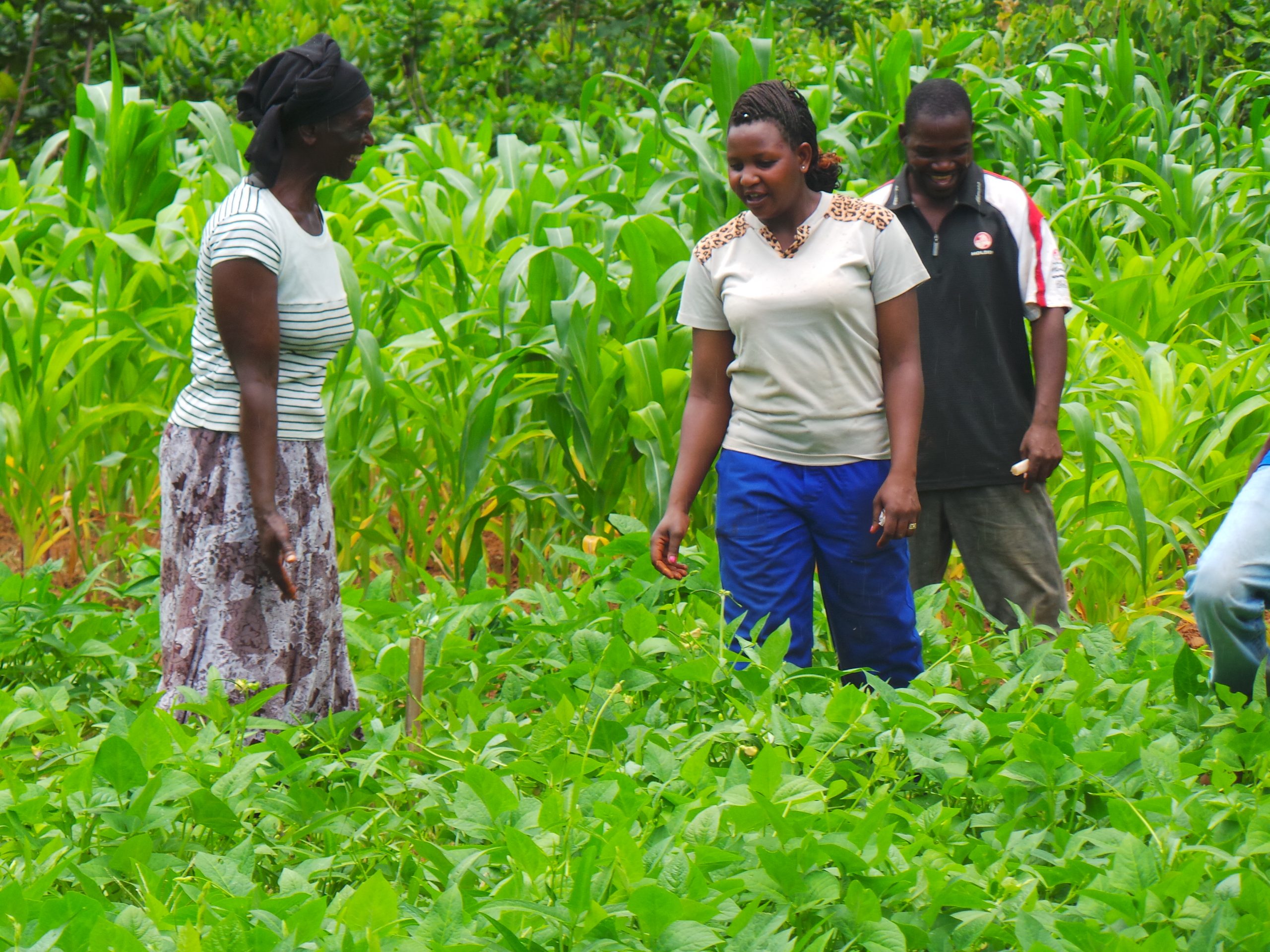
November 5, 2021, by Lexi Earl
The nutritional quality of crops and the impact of climate change
Today at COP26, discussions are focused around public empowerment and education in climate action. Galvanising public action is difficult but not impossible. Grace Kangara explains how promoting locally available organic nutrient resources to farmers is key to both improving soils and improving the nutritional quality of crops, ensuring the availability of micronutrient-dense foods at the farm-level.
Climate change has a noticeable effect on crop yields, reducing harvests through changing and unpredictable weather patterns. But climate change also has an effect on the nutritional aspects of staple grains. Recently the projected effects of changes in carbon dioxide (CO2) on crop nutritional quality have been made for wheat. Elevated CO2 levels are projected to decrease the grain iron and zinc concentrations, meaning that we will have less of these nutrients available to us when eating wheat and possibly other major crops. Micronutrient-dense foods are hugely important for growth and development, particularly in children. When micronutrients are missing, children suffer from stunting and malnutrition, cannot go to school and miss out on opportunities.
How might we improve nutrients in staple crops? One way is by using organic nutrient resources and micronutrient fertilisers that are readily available and affordable for poorer households. Rural households in Zimbabwe grow a variety of crops for consumption, including maize, sorghum, finger millet and cowpea. These crops are very important for household food security. Applying organic nutrient resources to maize increases grain zinc concentration by 13% and has the potential to contribute to daily zinc needs of children and adults. Organic nutrient resources like cattle manure, compost and woodland leaf litter are available locally, and are affordable by even the most resource-constrained farmers. It is well known that managing soil fertility is key to improving crop yields, but this research explores how soil fertility can increase micronutrients within grains, and how using locally available organic nutrient resources (complemented with micronutrient fertilisers) could help meet zinc and iron needs of those people currently at risk of micronutrient deficiencies in Zimbabwe.

Foliar application of iron fertiliser
Smallholder farmers are crucial in providing local food security to populations, particularly in rural areas. By working with farmers directly, and in partnership with agricultural extension workers, we can conduct on-farm field-based experiments which allow us to assess baseline micronutrient status in soils and crops. Co-learning and ideas sharing are key to this kind of research, and form an essential element in innovating traditional farmer practices and disseminating knowledge. Farmers need to be provided with technical advice and support in order to actually adopt changes to farming practices. Findings from the Ceres2030 international research consortium found that much research in agriculture was not relevant to the needs of smallholder farmers and their families, despite smallholders making up 475 million of the 570 million farms globally. For example, work on new technologies examined how particular technological tools work in isolation, rather than how they might work for farmers, or whether the new technology was better than existing practices.

Laboratory analysis of grain samples for multiple elements including zinc and iron
By unlocking the science behind what rural farmers already use and making known additional benefits of resources within their reach, we can help farmers produce more nutritious foods. The nutritional security of rural households is key to providing local and household food security, ensuring reductions in fatigue, better child development, and improved work productivity amongst people from farming communities. This will ensure an escape from poverty by Africa’s future generations.
Further reading:
Myers et al. (2014). Increasing CO2 Threatens Human Nutrition. Nature 510 (7503): 139–42. https://doi.org/10.1038/nature13179.
Editorial (2020). Ending hunger: science must stop neglecting smallholder farmers. Nature 586, 336.https://doi.org/10.1038/d41586-020-02849-6
Publications:
Manzeke et al. (2012) Soil fertility management effects on maze productivity and grain zinc content in smallholder farming systems in Zimbabwe. Plant and Soil 361, 57-69 https://doi.org/10.1007/s11104-012-1332-2
Manzeke et al. (2014) Zinc fertilisation influence on maize productivity and grain nutritional quality under integrated soil fertility management in Zimbabwe. Field Crops Research 166, 128-136 http://dx.doi.org/10.1016/j.fcr.2014.05.019
Manzeke et al. (2016) Managing soils to alleviate dietrary micronutrient deficiencies in Southern Africa: Possibilities and knowledge gaps. International Fertiliser Society https://fertiliser-society.org/store/managing-soils-to-alleviate-dietary-micronutrient-deficiencies-in-southern-africa-possibilities-and-knowledge-gaps/
Manzeke et al. (2017) Zinc fertilisation increases prodctivity and grain nutritional quality of cowpea (Vigna unguiculata [L.] Walp.) under integrated soil fertility management. Field Crops research 213, 231-244 https://doi.org/10.1016/j.fcr.2017.08.010
Manzeke et al. (2019) Fertilizer management and soil type influence grain zinc and iron concentration under contrasting smallholder cropping systems in Zimbabwe. Scientific Reports 9, 6445 https://doi.org/10.1038/s41598-019-42828-0.
Manzeke et al. (2020) Nitrogen effect on zinc biofortification of maize and cowpea in Zimbabwean smallholder farms. Agronomy Journal 112(3), 2256-2274 https://doi.org/10.1002/agj2.20175.
Manzeke-Kangara et al. (2021a) Can nitrogen fertiliser management improve grain iron concentration of agro-biofortified crops in Zimbabwe? Agronomy 11(1), 124 https://doi.org/10.3390/agronomy11010124
Manzeke-Kangara et al. (2021b) Good soil management can reduce dietary zinc deficiency in Zimbabwe CABI Agriculture and Bioscience 2: 36 https://doi.org/10.1186/s43170-021-00057-4
Muneta Grace Kangara is a soil scientist with a Bachelor of Science Honours degree in Soil Science (2008), a Masters in Soil Fertility and Plant Nutrition (2013), and a PhD in Soil Geochemistry and Plant Nutrition (2020); all from the University of Zimbabwe’s Department of Soil Science and Environment. She is currently a Research Fellow with the University of Nottingham’s Future Food Beacon and the School of Biosciences, coordinating a GCRF funded project: Translating GeoNutrition: Supporting policies to reduce mineral micronutrient deficiencies in Zimbabwe. Muneta’s work has received recognition and awards from several institutions including: i) The Brian Chambers Award for young scientists working in plant nutrition (2015), ii) The International Plant Nutrition Institute (IPNI) Scholar Award (2016), and iii) the Marschner Young Scientist Award: “Nurturing the future” in 2017.
Follow Grace on Twitter: @muneta_gmanzeke
No comments yet, fill out a comment to be the first

Leave a Reply